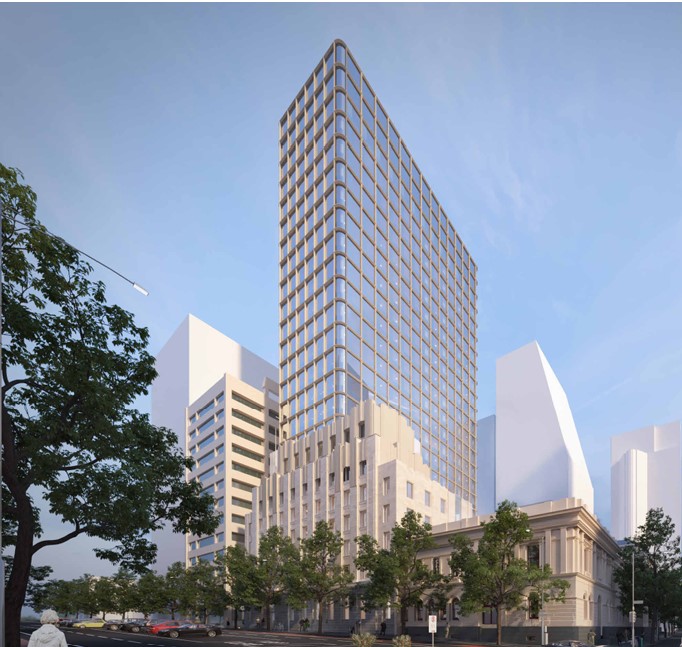Application for facadism of the Former Taxation Office

Feature Image: Render of proposed facadism at Former Taxation Office. Source: Wardle Studio
The National Trust has objected to a Ministerial Permit application made by the Department of Transport and Planning’s Land and Property Group to facade the Victorian Government owned Former Taxation Office at 436 Lonsdale St, Melbourne. Under the State Government Development Facilitation Program, the permit seeks part demolition of the existing building (all but the Lonsdale Street facade) and construction of a 23 storey building.
Built in 1924 the Taxation Office is classified by the National Trust and protected under a City of Melbourne local Heritage Overlay (HO717) as an individually significant building within a historic precinct.The Statement of Significance for the site notes,
The design of the building conveys a deliberate attempt to marry the Rennaissance style of the adjacent Titles Office with the “Wall Street” image of a modern financial building. It is a notable indicator of the early establishment of the Commonwealth Government in Melbourne.
The National Trust, as a matter of principle, does not support facadism as an acceptable heritage practice, and it is known to be widely disliked by the community. In 2021, we released our Facadism Discussion Paper, which states that,
Demolishing everything but the external face(s) of a building removes all evidence of how a building was used, its layout and arrangement, and the methods and materials of its construction – all of the things that made that building a lived place.
The National Trust strongly believes that the heritage significance of a place is associated with that place as a whole. It is evident in the bricks and mortar, but also in its internal spaces, which provide evidence of its former use and story. It does not rest only in the facade, even if this may appear to be a building’s most notable feature from the street level.
If everything but the facade of a building has been demolished, it is no longer a building, and most of its heritage significance has been lost. Facadism should therefore not be considered an acceptable heritage outcome in the redevelopment of a heritage place. Furthermore, this loss of significance cannot be mitigated through a token setback of a new development only a few metres from the facade. Enough original fabric must be retained to ensure that the heritage place can be appreciated and understood.
Facadism is also discouraged under the City of Melbourne Heritage Design Policy.
The National Trust strongly advocates for retrofitting and adaptive reuse of historic buildings to provide new uses for properties without requiring their demolition and addition to facadism being an unacceptable design for heritage buildings. Until 2021, the Former Taxation Office was being used by a number of public services to conduct day to day operations, before fire safety concerns lead to the former users ending their tenancy. Supporting documentation submitted by the Department of Transport and Planning (DTP) claims it was determined refurbishment of the building as office space was not viable due to a lack of interest from potential users. However we find the decision for wholesale demolition a rather extreme alternative and we are not satisfied that adaptive reuse to convert the existing building into a residential property was meaningfully explored by the State Government.
The demolition also goes against objectives of the Victorian Government’s Built Environment Climate Change Adaptation Action Plan;
- New and Existing Buildings – Consider the value of embodied energy contained in existing and heritage buildings (p13)
- Heritage – Identify and support conservation and adaptive reuse of heritage buildings as an alternative to new construction (p14)
The National Trust would expect a proposal by State Government to be exemplary, especially regarding heritage, when the department proposing the design is responsible for managing building and heritage systems to shape places and communities.
Read our full submission here.
+ There are no comments
Add yours